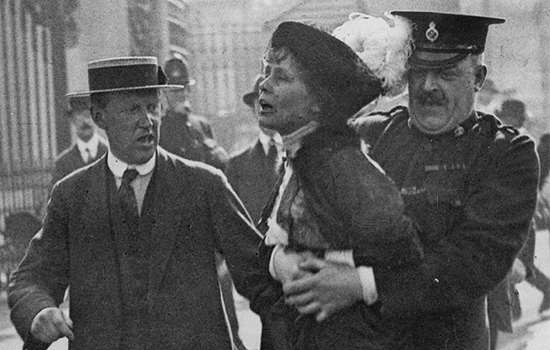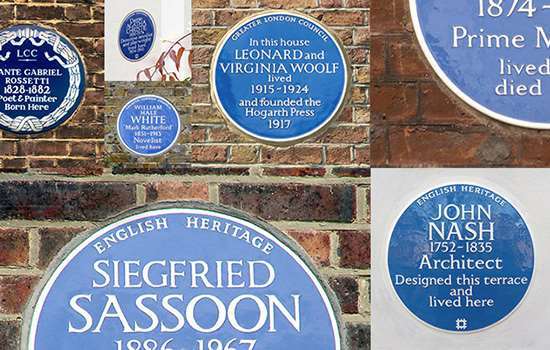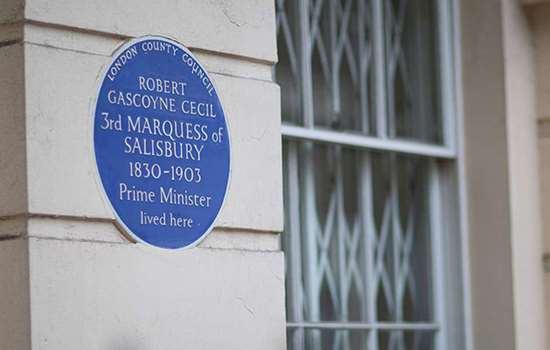GIELGUD, Sir John (1904-2000)
Plaque erected in 2017 by English Heritage at 16 Cowley Street, Westminster, London, SW1P 3LZ, City of Westminster
All images © English Heritage
Profession
Actor and Director
Category
Theatre and Film
Inscription
Sir JOHN GIELGUD 1904-2000 Actor and Director lived here 1945-1976
Material
Ceramic
One of the few performers to have won an Emmy, Grammy, Oscar and Tony, Sir John Gielgud is widely regarded as one of the nation’s finest actors. He lived at 16 Cowley Street in Westminster from 1945 until 1976, and a blue plaque now commemorates his 31-year residence there.
COWLEY STREET
Gielgud lived in 16 Cowley Street during some of the most important moments of his life. After establishing himself as one the nation's finest stage actors and directors in the 1930s, his time at number 16 saw him cement his reputation as a legend of theatre. He is remembered primarily as a Shakespearean actor but he took on increasingly varied work from the 1960s onwards, including roles in contemporary theatre.
One particular high point at Cowley Street was followed by his lowest: he was knighted in 1953 but only a few weeks later arrested and charged for homosexual activities – an event which made front-page news and led to a personal breakdown. His professional reputation, however, did not suffer. During and after his career he was a source of inspiration to many young actors including Alec Guinness, Paul Schofield and Michael Redgrave.
Gielgud’s home of 31 years was designed in about 1722 by Barton Booth, himself a successful actor. Gielgud frequently entertained friends and colleagues at number 16 and he shared the home with a menagerie of pets (which at one point included six dogs, two owls and a cockatoo) and, from 1950 to 1970, with Bernie Dodge, his cook, driver and manservant. Following Gielgud’s arrest in 1953, his sister Eleanor Ducker came to stay, acting as her brother’s secretary and protector.
In the 1960s Gielgud’s partner Martin Hensler moved in and would stay with the actor until his death. Gielgud’s letters record the ongoing decoration of number 16 and he remained fond of the house long after he had left London, referring to ‘dear old Cowley St’ in a letter of 1985.
The house was listed Grade II* in 1958, during Gielgud’s residence.
EARLY STAGE CAREER
Arthur John Gielgud was destined for the stage from birth. His mother, Kate Terry Gielgud, was the niece of Dame Ellen Terry and part of the Terry theatrical dynasty which dominated the London stage at that time. At Ellen Terry’s Jubilee at Drury Lane in 1906, 22 Terrys appeared in the final Masque.
Gielgud was saving pocket money to see West End shows from the age of 7, and at 17 he won a scholarship to Lady Benson’s dramatic school on West Cromwell Road, immediately followed by a scholarship to RADA in 1922–3. In the following years he became one the youngest actors ever to play Hamlet at the Old Vic and by 1935 he was directing Romeo and Juliet in the West End. In that acclaimed performance he alternated between Romeo and Mercutio with Laurence Olivier – their sole stage appearance together. Juliet was played by Gielgud’s long-time collaborator Peggy Ashcroft and the nurse by Edith Evans, whose blue plaque Gielgud unveiled in 1997.
After several years abroad playing to troops during the Second World War, Gielgud began working with the young director Peter Brook at Stratford and in his own season at the Lyric, Hammersmith, in 1953. That year he was knighted for services to theatre, following pressure from Olivier (his rival) and Ralph Richardson (his friend), who had received their knighthoods in 1947. It was widely believed that Gielgud had originally been overlooked for the knighthood on account of his sexual orientation and his conviction for ‘persistent opportuning’ in the same year reflected the increased persecution of gay men during the 1950s.
LATER YEARS
It was a measure of how far attitudes towards homosexuality had changed when in 1975 Gielgud played his first gay role, in Harold Pinter’s No Man's Land, directed by Peter Hall. It followed on from several roles in contemporary plays by playwrights such as Alan Bennett, David Storey and Charles Wood. Gielgud still maintained a presence in classical theatre, however, and appeared in five Shakespearean productions in three years when Hall took over as Director of the National Theatre in 1973.
Gielgud also began to take on more film roles and won an Oscar for Arthur (1981) – though he was much more pleased with the success that year of the Granada Television series Brideshead Revisited, in which he played Edward Ryder. He continued to play challenging and memorable parts into old age and he spent his 96th birthday filming with Harold Pinter and David Mamet for the Samuel Beckett drama, Catastrophe. This would be his last work, closing a career of more than 75 years. He died at home the following month, on 21st May 2000.


